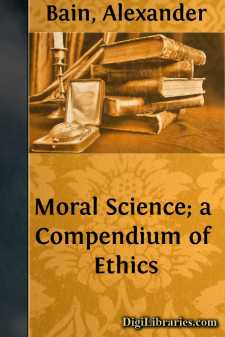Categories
- Antiques & Collectibles 13
- Architecture 36
- Art 48
- Bibles 22
- Biography & Autobiography 813
- Body, Mind & Spirit 142
- Business & Economics 28
- Children's Books 17
- Children's Fiction 14
- Computers 4
- Cooking 94
- Crafts & Hobbies 4
- Drama 346
- Education 46
- Family & Relationships 57
- Fiction 11829
- Games 19
- Gardening 17
- Health & Fitness 34
- History 1377
- House & Home 1
- Humor 147
- Juvenile Fiction 1873
- Juvenile Nonfiction 202
- Language Arts & Disciplines 88
- Law 16
- Literary Collections 686
- Literary Criticism 179
- Mathematics 13
- Medical 41
- Music 40
- Nature 179
- Non-Classifiable 1768
- Performing Arts 7
- Periodicals 1453
- Philosophy 64
- Photography 2
- Poetry 896
- Political Science 203
- Psychology 42
- Reference 154
- Religion 513
- Science 126
- Self-Help 84
- Social Science 81
- Sports & Recreation 34
- Study Aids 3
- Technology & Engineering 59
- Transportation 23
- Travel 463
- True Crime 29
Practical Essays
by: Alexander Bain
Categories:
Description:
Excerpt
I.
On the prevailing errors on the mind, proposed to be considered in this paper, some relate to the Feelings, others to the Will.
In regard to Mind as a whole, there are still to be found among us some remnants of a mistake, once universally prevalent and deeply rooted, namely, the opinion that mind is not only a different fact from body—which is true, and a vital and fundamental truth —but is to a greater or less extent independent of the body. In former times, the remark seldom occurred to any one, unless obtruded by some extreme instance, that to work the mind is also to work a number of bodily organs; that not a feeling can arise, not a thought can pass, without a set of concurring bodily processes. At the present day, however, this doctrine is very generally preached by men of science. The improved treatment of the insane has been one consequence of its reception. The husbanding of mental power, through a bodily régime, is a no less important application. Instead of supposing that mind is something indefinite, elastic, inexhaustible,—a sort of perpetual motion, or magician's bottle, all expenditure, and no supply,—we now find that every single throb of pleasure, every smart of pain, every purpose, thought, argument, imagination, must have its fixed quota of oxygen, carbon, and other materials, combined and transformed in certain physical organs. And, as the possible extent of physical transformation in each person's framework is limited in amount, the forces resulting cannot be directed to one purpose without being lost for other purposes. If an extra share passes to the muscles, there is less for the nerves; if the cerebral functions are pushed to excess, other functions have to be correspondingly abated. In several of the prevailing opinions about to be criticised, failure to recognise this cardinal truth is the prime source of mistake.
To begin with the FEELINGS.
I. We shall first consider an advice or prescription repeatedly put forth, not merely by the unthinking mass, but by men of high repute: it is, that with a view to happiness, to virtue, and to the accomplishment of great designs, we should all be cheerful, light-hearted, gay.
I quote a passage from the writings of one of the Apostolic Fathers, the Pastor of Hermas, as given in Dr. Donaldson's abstract:—
"Command tenth affirms that sadness is the sister of doubt, mistrust, and wrath; that it is worse than all other spirits, and grieves the Holy Spirit. It is therefore to be completely driven away, and, instead of it, we are to put on cheerfulness, which is pleasing to God. 'Every cheerful man works well, and always thinks those things which are good, and despises sadness. The sad man, on the other hand, is always bad.'"
[FALLACY OF PRESCRIBING CHEERFULNESS.]
Dugald Stewart inculcates Good-humour as a means of happiness and virtue; his language implying that the quality is one within our power to appropriate.
In Mr. Smiles's work entitled "Self-Help," we find an analogous strain of remarks:—
"To wait patiently, however, man must work cheerfully....



